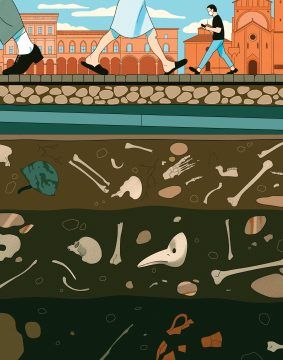Lawrence Wright in The New Yorker:
 Italy at the beginning of the fourteenth century was a conglomeration of prosperous city-states that had broken free of the feudal system. Some of them, such as Venice, formed merchant republics, which became seedbeds for capitalism. Venice and other coastal cities, including Genoa, Pisa, and Amalfi, set up trading networks and established outposts throughout the Mediterranean and as far away as the Black Sea. Other Italian cities, such as Bologna, became free communes, which meant that peasants fleeing feudal estates were granted freedom once they entered the city walls. Serfs became artisans. A middle class began to form. The early fourteenth century was robust and ambitious. Then, suddenly, people began to die.
Italy at the beginning of the fourteenth century was a conglomeration of prosperous city-states that had broken free of the feudal system. Some of them, such as Venice, formed merchant republics, which became seedbeds for capitalism. Venice and other coastal cities, including Genoa, Pisa, and Amalfi, set up trading networks and established outposts throughout the Mediterranean and as far away as the Black Sea. Other Italian cities, such as Bologna, became free communes, which meant that peasants fleeing feudal estates were granted freedom once they entered the city walls. Serfs became artisans. A middle class began to form. The early fourteenth century was robust and ambitious. Then, suddenly, people began to die.
Bologna was a stronghold of medical teaching. The city’s famous university, established in 1088, is the oldest in the world. “What they had we call scholastic medicine,” Pomata told me. “When we say ‘scholastic,’ we mean something that is very abstract, not concrete, not empirical.” European scholars at the time studied a number of classical physicians—including Hippocrates, the Greek philosopher of the fifth century B.C. who is considered the father of medicine, and Galen, the second-century Roman who was the most influential medical figure in antiquity—but scholastic medicine was confounded with astrological notions. When the King of France sought to understand the cause of the plague, the medical faculty at the University of Paris blamed a triple conjunction of Saturn, Jupiter, and Mars in the fortieth degree of Aquarius, which had occurred on March 20, 1345.
…Before arriving in Italy, the rampaging contagion had already killed millions of people as it burned through China, Russia, India, Persia, Syria, and Asia Minor. It was said that there were entire territories where nobody was left alive. The source of the disease was sometimes thought to be “miasma,” or air that was considered unhealthy, such as sea breezes. Paradoxically, there was also a folk belief that attendants who cleaned latrines were immune, which led some people to confine themselves for hours a day amid human waste, absorbing the presumed medicinal odors.
More here.
